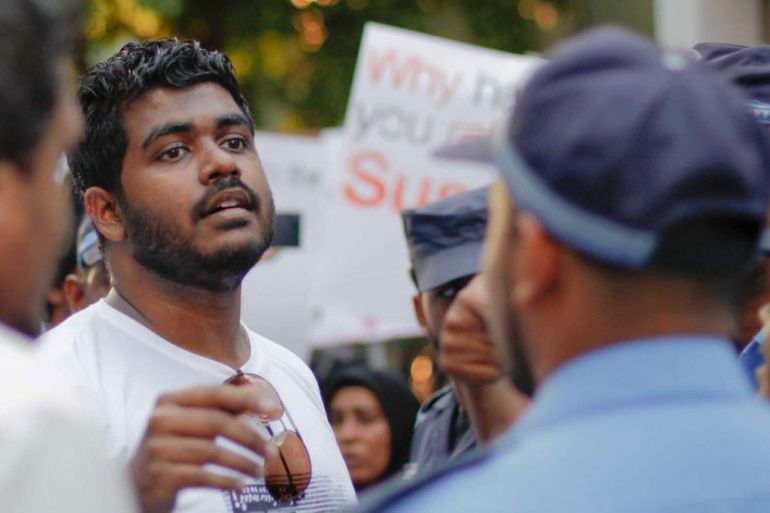ISIS Hand? Paradise Turns Into Crime Scene As Blogger Brutally Killed In Maldives

NEW DELHI: The United Nations has called for an immediate investigation into the brutal killing of liberal blogger Yameen Rasheed, who died after he was found at his Male apartment with multiple stab wounds. Fear regarding the role of the Islamic State has gripped Rasheed’s death, as the blogger was a vocal critic of radical Islamic. Another important context, however, is that of Rasheed’s critique of the Maldivian government, and his death comes as Maldives sees an upsurge in arrests and prosecutions of the political opposition.
Rasheed had reportedly complained to the police about receiving death threats, and in previous interviews to the media, he had said that the police often failed to return his calls or dropped his complaints without investigation. Rasheed was also a coordinator of a campaign to find his friend Ahmed Rilwan Abdulla, a journalist who had been abducted in 2014.
News reports have linked the murder to the rise of the Islamic State in the Maldives, as the picturesque island nation has also seemingly become a source of recruits for the extremist group. The government says that at least 49 Maldivians have travelled to Syria to join the Islamic State, while independent analyses put the number closer to 200.
The above has led most media organisations to point to an ISIS link, with the New York Times writing: “The population, which is predominantly Sunni Muslim, has traditionally been liberal in its interpretation of Islam, with women rarely covering their heads. But a more conservative strain of Islam has spread in recent years under the increasing influence of Saudi Arabia, which sends religious leaders to the Maldives and offers scholarships to Maldivian students to study at Saudi universities.”
A more pressing link, however, is that of the government, as Rasheed wrote several critical pieces targeting the Maldivian administration. The UN High Commissioner for Human Rights Zeid Ra'ad Al Hussein highlighted the above when condeming Rasheed’s death on Monday. Mr Rasheed's killing comes in the context of what appears to be an upsurge in arrests and prosecutions of the political opposition," Zeid's spokesperson Ravina Shamdasani said in a statement, additionally calling for a swift and thorough inquiry into the killing, in line with international standards.
"We remind the state that it has a duty to ensure that journalists, civil society actors and human rights defenders are able to exercise their rights to freedom of expression and opinion without fear for their safety," Shamdasani said.
The UN had previously criticised the government of President Abdulla Yameen for the arrest and jailing of a former president and a former defence minister.
On his part, President Yameen issued a statement condemning the brutal murder. “We condemn this action in the harshest terms… All resources of the state will be utilized to bring the perpetrators of this heinous crime to justice.”
Rights group Amnesty International also highlighted the fact that the murder took place against the backdrop of the Maldivian authorities’ growing restrictions on public debate. “This crackdown has intensified in recent weeks and must end immediately,” the organization said. “Authorities should protect those who speak out, not try to criminalize them.”
Rasheed, who wrote satirical pieces targeting the government and the spread of radical Islam on his website The Daily Panic, had highlighted the threats to his life in several interviews over recent years. Recently, in an interview with NYT in January, Rasheed described how bloggers like himself and Abdulla were targeted by radicalized gangs in the Maldives -- the same gangs from which the Islamic State tried to recruit fighters.
Rasheed told NYT that in recent months, nearly all of the 20 members of the group committed to finding Abdulla had received death threats. The threats directed at Rasheed reportedly began to intensify in December last year, as his name was being circulated amongst extremist elements in the country.
A few months before Abdulla was kidnapped, a mob abducted several men who were reportedly affiliated with a Facebook group that called for secularism, and forced them to cite parts of the Quran before releasing them.
Also in 2014, a journalist with the independent Minivan News, Ahmed Rilwan, was probably abducted, as he has been missing since. A few years before in 2012, blogger Ismail Rasheed narrowly escaped death after he was stabbed by an unidentified attacker.
(Cover photo: Yameen Rasheed at a protest in Male' calling a proper investigation into missing journalist Ahmed Rilwan Abdulla)



